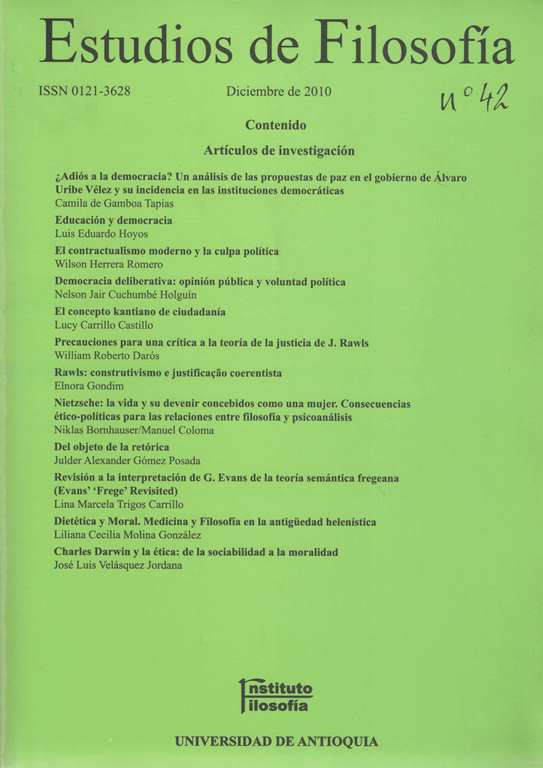El concepto kantiano de ciudadanía
DOI:
https://doi.org/10.17533/udea.ef.11595Palabras clave:
Dignidad, derechos, ciudadanía, sentido común.Resumen
En el prólogo a la Fundamentación de la metafísica de las costumbres Kant advierte sobre la diferencia entre una reflexión sobre el fundamento de la moral y la idea de cómo ‘aplicar’ el principio de la moralidad a la vida cotidiana de los humanos. Según su propio punto de vista, la pregunta de cómo implementar la moral en la vida práctica supone la necesidad de adoptar la perspectiva de una antropología pragmática. En ese sentido, el objeto de este ensayo es hacer una lectura pragmática del concepto de ciudadanía de Kant, desde la cual se comprende mejor su convicción de que lo político debe construirse sobre el fundamento de la moral: el respeto por la dignidad humana. Este punto de vista pragmático me permitirá aclarar: a) por qué piensa Kant que las graves dificultades de la política estriban en la tarea saber y poder establecer las medidas necesarias para garantizar el respeto a los derechos fundamentales, y b) de qué manera el concepto kantiano de ciudadanía cimenta la idea del reconocimiento mutuo de derechos y deberes. Para ello divido este ensayo en tres apartados: 1. Las ideas de derechos humanos y ciudadanos, y el concepto de derecho cosmopolita. 2. El concepto de ciudadanía a la luz de su concepto de un estado republicano; y 3. Cómo fue concebida por Kant la noción de ciudadanía para gente común y corriente, con sentido común.
Descargas
Citas
ARENDT, H. (1992). Lectures on Kant’s Political Philosophy. Chicago: Chicago University Press.
ARENDT, H. (1999a). Orígenes del totalitarismo II. Madrid: Alianza.
ARENDT, H. (1999b). Orígenes del totalitarismo III. Madrid: Alianza Editorial.
BENHABIB, S. (2006). Hospitality, Sovereignty, and Democratic Iterarions. En S. Benhabib, Another Cosmopolitanism (Berkeley Tanner Lectures) (págs. 147-186). Oxford: Oxford University Press. DOI: https://doi.org/10.1093/acprof:oso/9780195183221.003.0007
BENHABIB, S. (2004). Los derechos de los otros. Extranjeros, residentes y ciudadanos. Barcelona: Gedisa.
BLOOM, A. (1987). The Closing of the American Mind. New York: Simon & Schuster.
GUYER, P. (2008). Knowledge, Reason and Taste: Kant’s Response to Hume. Princenton: Princenton University Press. DOI: https://doi.org/10.1515/9781400824472
HABERMAS, J. (1996). Kants Idee des ewigen Friedens - aus dem historischen Abstand von zweihundert Jahren. En M. Lutz-Bahcmann, & J. Bohman (Edits.), Frieden durch Recht. Kants Friedensidee und das Problem einer neuen Weltordnung. Frankfurt: Suhrkamp. DOI: https://doi.org/10.5771/0023-4834-1995-3-293
KANT, I. (1977). Werke in zwölf Bänden. (W. Weischedel, Ed.) Frankfurt: Suhrkamp.
KORSGAARD, C. (1996). Creating the Kingdom of Ends. Cambridge: Cambridge University Press. DOI: https://doi.org/10.1017/CBO9781139174503
LOCKE, J. (2003). Two Treatises of Government and A Letter Concerning Toleration. (I. Shapiro, Ed.) Yale: Yale University Press.
MARX, K. (2007). On the Jewish Question. En M. Ishay (Ed.), The Human Rights Reader. Major Political Essays, Speeches, and Documents from Ancient Times to the Present (págs. 263-271). New York/London: Rotuledge.
PATON, H. J. (1948). Categorical Imperative. A Study in Kant’s Moral Philosophy. Pennsylvania: Pennsylvania University Press.
SCHILPP, P. A. (1966). La ética precrítica de Kant. México: Centro de Estudios Filosóficos.
STRAUSS, L. (2006). La filosofía política de Hobbes. Su fundamento y su génesis. Bs. As.: Fondo de Cultura Económica.
TUGENDHAT, E. (2001). ¿Cómo debemos entender la moral? En E. Tugendhat, Problemas. Barcelona: Gedisa.
TUGENDHAT, E. (2008). El origen de la igualdad normativa. En E. Tugendhat, Antropología en vez de metafísica (págs. 115-138). Barcelona: Gedisa.
TUGENDHAT, E. (1992). Liberalism, Liberty and the Issue of Economic Human Rights. En E. TUGENDHAT, Philosophische Aufsätze. Frankfurt: Suhrkamp.
WOOD, A. (2008). Kantian Ethics. Pennsylvania: Pennsylvania University Press.
Descargas
Publicado
Cómo citar
Número
Sección
Categorías
Licencia
Derechos de autor 2010 Lucy Carrillo Castillo

Esta obra está bajo una licencia internacional Creative Commons Atribución-NoComercial-CompartirIgual 4.0.
Los autores que publican en Estudios de Filosofía acuerdan los siguientes términos:
1. El Autor retiene el copyright del "Artículo", por el cual se entiende todos los objetos digitales que pueden resultar de la subsiguiente publicación o distribución electrónica.
2. En conformidad con los términos de este acuerdo, el autor garantizará a Estudios de Filosofía como Editor el derecho de la primera publicación del artículo.
3. El Autor le concederá al Editor un derecho perpetuo y no-exclusivo, así como una licencia de la misma clase, de publicar, archivar y hacer accesible el Artículo parcial o totalmente en todos los medios conocidos o por conocerse, derecho y licencia que se conocen como Creative Commons License Deed. Atribución-No Comercial- Compartir igual CC BY-NC-SA o su equivalente que para efectos de eliminar toda duda, le permite a otros copiar, distribuir, y transmitir el Artículo bajo las siguientes condiciones: (a) Atribución: Se deben reconocer los créditos de la obra de la manera especificada por el Autor a Estudios de Filosofía, pero no de una manera que sugiera que tiene su apoyo o que apoyan el uso que hace de su obra. (b) No Comercial: No se puede utilizar el Artículo para fines comerciales.
4. El Autor puede realizar otros acuerdos contractuales no comerciales para la distribución no exclusiva de la versión publicada del Artículo (v. gr. ponerlo en un repositorio institucional o publicarlo en un libro) con la condición de que haga el debido reconocimiento de su publicación original en Estudios de Filosofía.
5. A los Autores se les permite y Estudios de Filosofía promueve publicar en línea (online) la versión pre-impresa del Artículo en repositorios institucionales o en sus páginas web, antes y durante la publicación, por cuanto que puede producir intercambios académicos productivos, así como una mayor citación del Artículo publicado (ver The Effect of Open Access). Dicha publicación durante el proceso de producción y en la publicación del Artículo se espera que se actualice al momento de salir la versión final, incluyendo una referencia a la URL de Estudios de Filosofía.















